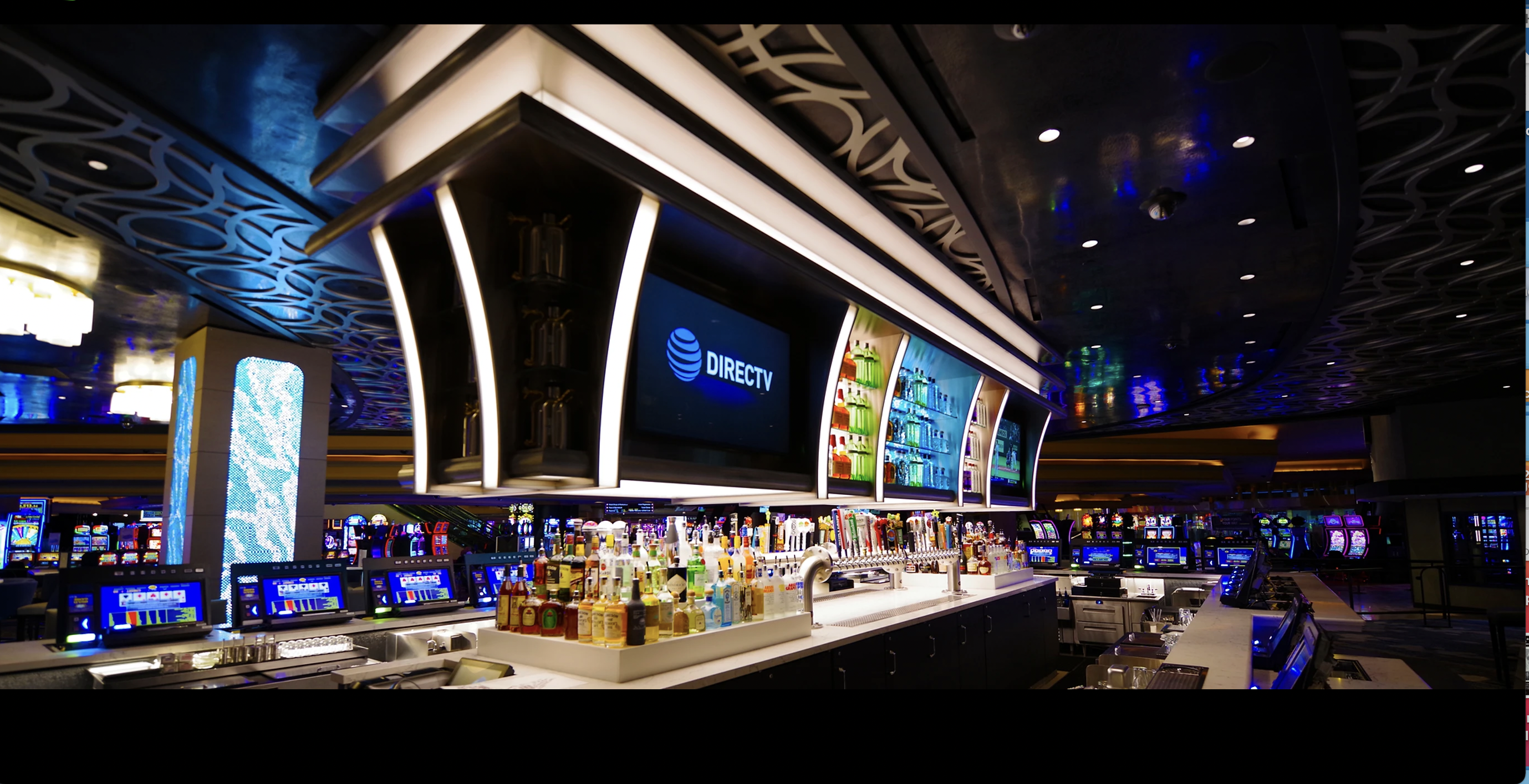Tech Focus: Sportsbooks, Part 1 — Broadcast Sports but Bigger, Brighter, Louder
A legal quirk allows casinos to make a big bet on broadcast sports
Story Highlights
“You can go to one game, or you can go to many games.” That’s how Josh Francois, managing director, spectaculars, Daktronics, views the casino-sportsbook landscape today. After a 2018 Supreme Court ruling allowed individual states to determine their own sports-gambling regulations, the sector — once characterized by smoky backrooms at casinos in Las Vegas and Atlantic City, with 4:3 CRT displays showing second-string horse races — has become a turbocharged sports experience. Giant 4K displays take scaled-up global feeds of broadcast sports on a 24/7 basis.

Daktronics’ Josh Francois: “It’s not a bunch of old guys smoking bad cigars watching the ponies anymore.”
“It’s not a bunch of old guys smoking bad cigars watching the ponies anymore,” says Francois, who has watched the sportsbook concept evolve over the past five years from “an amenity the hotels had just to keep you on the property to a destination that the manager at Circa Las Vegas [at 70,000 sq. ft., the largest sports book in Las Vegas, with 98 million pixels in displays installed by Daktronics] described as ‘the Disneyland of sports.’”
One effect of the court decision on gambling was a jump in activity around casino sportsbooks. Venues saw revenues soar almost immediately: for instance, New Jersey’s sportsbooks reported $40.7 million in wagers the first full month after the ruling, nearly triple the previous month’s take.
Broadcast Sports Provides the Content
That surge in revenue has fueled a wave of renovation in the sportsbook vertical, which relies on broadcast-sports content, particularly that supplied by DirecTV but also from cable and, increasingly, OTT sources.
Sportsbooks currently take the same broadcast feeds sent over on-air networks and cable, scaling them for the venue’s larger-than-life ambience. According to Eric Winnicki, senior project manager, McCann Systems — which has built sportsbooks in major-league sports venues, including the Capital One Arena in Washington, DC, and the Caesar’s Sportsbook at the MLB Diamondbacks’ Chase Field in Phoenix — integrators take a very broadcast-centric “24/7 no-fail” approach to the technology. They use switches and scalers from broadcast-standby suppliers like Evertz and take main feeds from sources like DirecTV and backup signals from Comcast and other providers in case weather or other incidents disable the satellite dish.
Fail-Safe Operation
AV-systems integration for modern sportsbooks has understandably become more complex, with casino owners and managers looking to accommodate as wide a range of sports as possible and to be able to switch on a dime when multiple events are taking place.

Alpha’s Lance Hutchinson: “Casino operators want systems that are easy to manage, to accommodate guest requests to see any specific game available.”
“Casino operators want to make sure that the systems are easy to manage, to accommodate guest requests to see any specific game available the guest may be betting on,” explains Lance Hutchinson, VP, Alpha, an integrator whose portfolio includes Harrah’s Cherokee Casino Resort in North Carolina and the Coushatta Casino Resort in Kinder, LA. “That makes system operation and integration critical. The backend system needs to be able to link in cable and satellite guide data in real time so that operations staff doesn’t have to spend time searching for a particular matchup. Our typical solutions allow the operations team to sort games by type — football, soccer, NBA, college — as well as to show what games are live right now. This makes it very easy to allow the programming to be displayed instantly.”
A Transition to Streaming
Broadcast supplies the core of content, but sports media is rapidly shifting toward streaming. Winnicki speculates that an all-IP content-delivery environment for the largest sportsbooks could be a reality as soon as the start of the 2024 NFL season. And, he warns, that migration could bring disruptive changes to the burgeoning sector: “The networking teams at the sportsbooks are going to have make sure their networks are bulletproof, super solid. If the network goes down, it all goes down.”

Coherent Design’s Kevin Potts: “More and more [sportsbooks] realize that the audio is part of what gets the crowd engaged.”
“The big challenge with streaming will be managing all the different online services, which will be way different from just having banks of DirecTV boxes,” he says. “Computers have a tendency to go to sleep, and there are all sorts of issues from different operating systems. It’s all stuff we’ll have to figure out.”
(In fact, an early test of streaming may come this fall in college football. Notre Dame games will be carried on streaming service Peacock instead of linear NBC because of a protracted carriage battle between Nexstar Media Group and DirecTV.)
Timely Betting Data With Graphics
As entertainment-centric as these destinations become, the target audience in a sportsbook is still the bettors, and they need data to base their wagers on. Fortunately, even that can be made more engaging.
“We typically employ ticker services that supply more-interesting data in the text content that goes along, as well as graphics that are integrated into the data feeds,” says Hutchinson. “The speed at which tickers get updated information is also critical; services that are one- to two-minutes behind real time can be important to operators and give a much more impactful experience to guests. Many services can be 10-30 minutes behind real time, which guests will notice as they watch other real-time updates on various broadcasts being displayed.”
Solotech Senior Business Development Representative Pete Healey cites a sportsbook project driven by the ticker: an LG 2.5-mm direct-view LED display, incorporating the QSC Q-SYS control platform for its control infrastructure, acts as a live RSS feed for the ticker. “The Q-SYS platform will be controlling a variety of QSC’s ceiling and pendant speakers, in addition to high-performance audio systems for the live-performance stages, as well as an assortment of 172 LG displays, including tiling screens and standard commercial displays.”
Audio: ‘More Than Just Crowd Noise and Talking Heads’
However, although many sportsbooks aim to match the thunder of the stadium or the arena, most of the source audio tends to be crowd sounds, which are fairly indistinct.
“It’s mostly announcements, talking heads, and crowd noise,” says McCann’s Winnicki. “You’re not looking at super-high-fidelity sound there. We try to build the headroom in the system needed for a big event, like a Super Bowl, when it’s naturally going to get louder. But we’re also not trying to re-create a theater setting.”
A significant difference between sports venues and sportsbooks when it comes to audio, he contends, is that the former have been spending decades and millions of dollars on improving the range, types, and quality of the sound in the stadium or arena, whereas the latter need only reproduce it reasonably faithfully.
On the other hand, some books will prioritize the broadcast sound. Coherent Design’s Potts says regional venues want bigger sound to amp up audiences and betting while larger ones need to keep up with the competition, particularly in places like Las Vegas. And some of both strata of venue are embracing surround sound: both Rivers Casino in Chicago suburb Des Plaines and the huge Circa sportsbook on the Las Vegas Strip have deployed 7.1-surround audio systems, straddling broadcast and cinema sound formats, and high-end live-sound brands — such as d&b, L-Acoustics, Meyer Sound — make regular appearances.
“Sometimes the sound takes a bit more convincing,” says Potts, “and some sportsbooks want to go for more of a sports-bar atmosphere. But more and more of them realize that the audio is part of what gets the crowd engaged.”
 Solotech Senior Design Engineer Jamie Gillespie notes that audio includes effects and nat sound, all of which needs to translate well in the sportsbook. In one installation, he included a delay ring of speakers timed to the largest video screen as a way to keep attention focused on it around the room.
Solotech Senior Design Engineer Jamie Gillespie notes that audio includes effects and nat sound, all of which needs to translate well in the sportsbook. In one installation, he included a delay ring of speakers timed to the largest video screen as a way to keep attention focused on it around the room.
“The networks have so many audio effects associated with graphic effects; game effects; sound, such as player hits in football, the crack of the baseball hitting the bat, noises in boxing, and so on,” he says. “All those sounds bring excitement to the game and to the experience. It’s so much more than just crowd noise and talking heads.”
Still, like the stadium and arena whose ambience is being emulated, sportsbooks need to be multipurpose venues, and for the same reasons: the books are becoming ever more costly to build — Circa’s sportsbook, purportedly the world’s largest, reportedly cost more than $20 million — and have their own ROI necessities.
“We’re seeing casino operators build their sportsbooks to be more multipurpose in slow sports days/times, to still give guests an experience they will remember,” says Hutchinson. “That could include a stage for a live band or a space for guests to take a break.”
Sportsbooks, having gone from afterthoughts to moneymaking destinations in a matter of a few years, are about to face their next inflection points. In addition to the challenges of adapting to streaming, they’ll likely have to incorporate and integrate new technologies — such as AI, bots armed with vast quantities of data gleaned from microchips strategically placed in balls, helmets, and jerseys; stadium cameras tracking players as they move across the field; perhaps even athletes’ own biometric data — paired with specialized algorithms to inform wagers.
Sportsbooks will also need to stay physically impressive, to compete with online versions, such as DraftKings Sportsbook, FanDuel Sportsbook, and the forthcoming ESPN BET (the former Barstool Sportsbook).
So sit back in a plush chair, order a cocktail, and watch — on a really big screen — as this rocket-fueled sports-media sector continues its wild ride into the future. You can bet on it.
Click here for Tech Focus: Sportsbooks, Part 2 — Sports Venues Give Betting Parlors a Run for Their Money.
